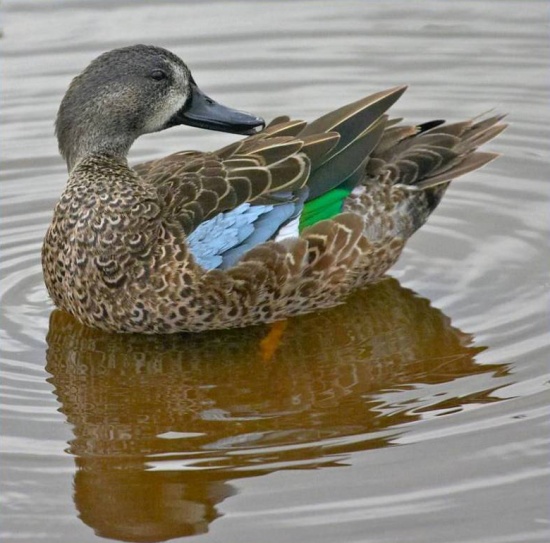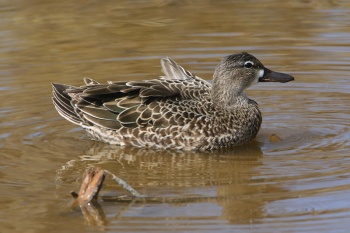(Distribution. Taxonomy amended. Reference added) |
m (Typo) |
||
| Line 21: | Line 21: | ||
This is a [[Dictionary_M-S#M|monotypic]] species<sup>[[#References|[1]]]</sup>. | This is a [[Dictionary_M-S#M|monotypic]] species<sup>[[#References|[1]]]</sup>. | ||
| − | Subspecies ''orphna'' is generally considered invalid<sup>[[#References|[ | + | Subspecies ''orphna'' is generally considered invalid<sup>[[#References|[2]]]</sup>. |
==Habitat== | ==Habitat== | ||
Marshes, shallow ponds, and lakes. | Marshes, shallow ponds, and lakes. | ||
Revision as of 15:30, 12 July 2010
- Anas discors
Identification
L. 14-16" (36-41 cm)
- Small brown duck
- Pale blue shoulder patches.
Male
- Gray head
- White crescent in front of eye
Female
- Mottled brown, similar to female Cinnamon Teal, but with obscure patterning on face
- Grayer and larger billed than female Green-winged, with pale blue shoulder patches like male.
Distribution
Breeds from southeastern Alaska and western Canada to Canadian Maritimes and south to northeastern California, New Mexico, and New York.
Winters from southern California, southern Texas, and the Carolinas southward through tropical America.
Vagrants are record in the British Isles annually, but some may have escaped from wildfowl collections.
Taxonomy
This is a monotypic species[1].
Subspecies orphna is generally considered invalid[2].
Habitat
Marshes, shallow ponds, and lakes.
Behaviour
These birds fly in small groups or flocks.
Breeding
The female incubates the 9-12 dull white eggs in a down-lined hollow concealed in grass near water. The male guards.
Vocalisation
Soft lisping or peeping note. Female utters a soft quack.
References
- Clements, JF. 2008. The Clements Checklist of Birds of the World. 6th ed., with updates to December 2008. Ithaca: Cornell Univ. Press. ISBN 978-0801445019.
- Avibase
- eNature
- Collins Bird Guide ISBN 0 00 219728
Recommended Citation
- BirdForum Opus contributors. (2024) Blue-winged Teal. In: BirdForum, the forum for wild birds and birding. Retrieved 2 May 2024 from https://www.birdforum.net/opus/Blue-winged_Teal






